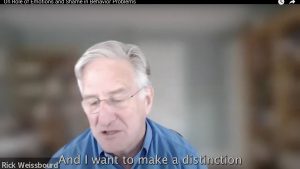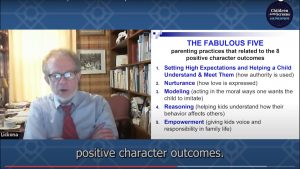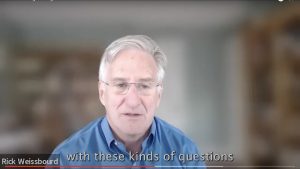
Richard Weissbourd, EdD (Senior Lecturer on Education, Faculty Director, Human Development and Psychology, Harvard Graduate School of Education) discusses the importance of helping kids manage feelings of shame and guilt [in behavior modifications] at #AskTheExperts webinar “The Golden Rule: Cultivating Kindness and Character Online” on June 15, 2022.
[Dr. Richard Weissbourd]: But the other thing that gets in the way is that, is our feelings, that emotions are the engines of our moral life. That shame, envy, jealousy, frustration, fear, anger can all cause us to violate other people. Usually when we transgress, it’s not because we didn’t know right from wrong. It’s because we were flooded, swamped, overwhelmed with a feeling we couldn’t control. I still play pickup basketball and I was playing pickup basketball the other day and somebody said, “Who’s covering the old guy?” And I’m looking around like, well, who who are you talking about? And my team said, “Well, Rick, of course they’re talking about you.” But now I’m riled up. Now it’s war, like we are all-I’m not defending this. This was not my proudest moment. But we are all vulnerable to feelings of embarrassment or shame or anger or envy. And it’s vital that we help kids to manage these feelings. And I want to make a distinction between guilt and shame. And I worry especially about shame, because I think shame is the cause. And Jim Gilligan’s work, other people’s work, that shame is so often the cause of violence it is so often the cause of bullying, of delinquency, of behavior problems of many kinds. You know, guilt is when you violate one of your principles. Guilt is a deed. It’s an action. And the good news about guilt is that it typically insists on and reveals the path to repair itself. You can make amends. You can apologize. Shame is the public exposure of defects in the self. And I think in our social media life, we are especially vulnerable to the public exposure of defects in the self. And so that we really need to talk to kids about both how to avoid situations that flood them with shame, but also strategies for managing shame.
View the full webinar

The Golden Rule: Cultivating Kindness and Character Online
How can we help children develop moral character and values such as kindness and compassion online and offline?
Stephen Post, PhD
Director; Professor of Family, Population and Preventive Medicine
Thomas Lickona, PhD
Professor Emeritus of Education; Director
Richard Weissbourd, EdD
Senior Lecturer on Education; Faculty Director
Eva Telzer, PhD
Co-Director; Associate Professor of Psychology and Neuroscience,



